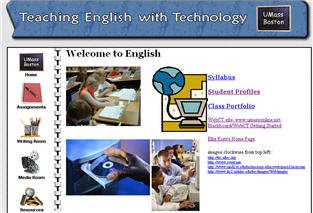I have to say that Krause's article was by far my favorite. Immediately, the title caught my eye, as the word "bad" jumped off the page! For some reason, when it comes to technology, I am more interested in the criticisms than the benefits. I think that there can be so many "speed bumps" and "glitches" when it comes to technology, that I'd rather face those first and then have a better feel for what I am getting into!
Overall, the only things that Krause seemed to have a hard time with were the specific expectations he had for his students while blogging. He wished he had facitlitated the student's collaborations a little more. He realized he needed to give specific details on how many times the kids commented and on exactly what they needed to comment about. This all reminds me of our first week of class!
What I am realizing through all of this internet "converstaion" is that if there aren't clear expectations, student can really miss the mark. For some reason, blogging and wikis don't seem as formal as writing. This could be my own fault though, as I feel the effects of spending too many years writing informal emails where the grammar, capitalization and punctuation would horrify you, or possibly all those years of high school and college "IMing", which couldn't get any more informal! I just associate internet talk with "quick" and "lazy" writing!
However, I supposed the informality of it could actually be a welcoming aspect to some students. Like Krause and a few other authors this week stated: the focus on writing through the internet introduces a whole new aspect of writing for a different audience, their peers. Writing seems to improve DRAMATICALLY when kids write for each other as opposed to writing for their teacher or for a grade. So, in all actuality, the "informal" criticisms I have may just be in fact what some students need to step up the quality of what they write and the ability they possess to do it!
Course homepage

Course homepage
Subscribe to:
Post Comments (Atom)
5 comments:
Janet, I agree with you that blogs and wikis are set up for less formal writing. I think they are best suited for journaling or self expression; more of a one-sided conversation. I know there are places to comment like I'm doing; however, the format of the long scroll down reading makes me feel like I'm reading the news online or something and not having a discussion. But if you look at the positive side of wikis and blogs and realize it's a way to get students writing, then I guess we should be happy they serve their purpose like you say.
Writing for a blog or wiki probably would seem less informal for students. It would probably seem fun -- which, for many students I've taught, would not be a word associated with writing. There's an element of writing for a blog that is just more personal, more expressive, than what might be required for a traditional expository essay. Plus, there is the notion of being published -- that others will end up reading your comments. Ultimately, though, I think it's writing for an audience; the audience for a blog is different from the audience for an expository essay. (Random people on Internet versus boring English teacher...) We need to encourage students to do both...
I think that the informal atmosphere of blogging would serve well as a sounding board for students. I think it would be effective in a classroom that involves both expository and creative writing. I agree when Lucien says that blogging is writing for an audience that is less boring than an English teacher - I think that will appeal to students. I also think that anything that varies from the traditional pen and pencil routine (which is, of course, indispensible) is appealing to students.
Janet mentions the need for clear expectations. One of the things that I found interesting about using blogs in an undergraduate writing class was that we had to discover the expectations--they weren't a codified and mostly unexamined set of "rules" about thesis statements, topic sentences, and paragraph length. We had to read a lot of examples of blogs, figure out what made them work as they did for us as readers, and generate some tentative rules for the genre that we would then try out in creating our own blogs (as well as thinking about how we might push those conventions). It was a very dynamic process, but the work was much like one might undertake in writing within any new genre.
Yes, thinking about my 7th grade students, clear expectations would be a MUST in order for many students to handle such a task. My concern, particularly in regards to my current students, would be them all having access to the internet in order to contribute to a blog. Is there anyone that uses them now? Do you allow students to have time in class/after school to complete their assignments or do they have to just handle it on their own?
Post a Comment